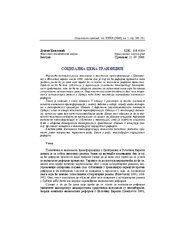Приказ основних података о документу
Social costs of transition
Socijalna cena tranzicije
| dc.creator | Pavlović, Dušan | |
| dc.date.accessioned | 2021-04-02T11:46:30Z | |
| dc.date.available | 2021-04-02T11:46:30Z | |
| dc.date.issued | 2006 | |
| dc.identifier.issn | 0085-6320 | |
| dc.identifier.uri | http://rfpn.fpn.bg.ac.rs/handle/123456789/121 | |
| dc.description.abstract | The risk of political and economic transformation in Central and East Europe after 1990 was based on the presumption that the reforms will collapse when the citizens realize that the cost they have to pay for them is too high. The classical claim was that democracy will be destroyed by democratic means-namely, that the losers in the transition will vote the way back to the authoritarian regime. The article offers an explanation as to the regress to the authoritarian regime will not be a consequence of the economic reforms. The article is divided in six section. Section 1 considers the general context of the start of the economic transformation in the light of the debate about the choice between the expert government and the significance of democratic procedures for economic reforms. Section 2 defines the context of Serbia within which economic transformation started out after 2000. Sections 4-5 consider economic policy of the two post-Milosevic government. The major finding is that it was the economic policy that was highly socially sensible that prevented social uprising and undermining democracy by democratic means. Section 6 concludes by applying the concept of equilibrium of partial reforms. | en |
| dc.description.abstract | Najčešće pominjani rizik ekonomske i političke transformacije u Centralnoj i Istočnoj Evropi posle 1990. godine bio je taj da će reforme propasti kada građani uvide da je cena koja treba da se plati za ekonomske reforme previsoka. Tvrdilo se da će tzv. gubitnici u tranziciji uništiti demokratiju demokratskim sredstvima, odn. da će na izborima glasati za političke snage koje će ponovo uspostaviti autoritarni režim. Ovaj tekst pokušava da objasni zbog čega povratak u autoritarni režim u Srbiji neće biti posledica sprovođenja ekonomskih reformi. Tekst je podeljen u šest odeljaka. U odeljku 1 razmatra se opšti kontekst početka ekonomske transformacije u svetlu debate o izboru između vlade eksperata i demokratskih procedura. Odeljak 2 definiše socialnoekonomski kontekst Srbije u kome se odvija ekonomska transformacija. Odeljci 4-5 analiziraju ekonomsku politiku prve dve post-miloševićevske vlade. Nalaz ovih odeljaka je da je ekonomska politika počivala na principima sa ciljem da ublaže socijalne troškove ekonomske transformacije za gubitnike u tranziciji, što je sprečilo socijalni bunt i obaranje demokratije demokratskim sredstvima. Odeljak 6 zaključuje analizu primenom koncepta o ekvilibrijumu parcijalnih reformi. | sr |
| dc.publisher | Sociološko društvo Srbije, Beograd | |
| dc.rights | openAccess | |
| dc.rights.uri | https://creativecommons.org/licenses/by-sa/4.0/ | |
| dc.source | Sociološki pregled | |
| dc.subject | economic policy | en |
| dc.subject | economic transformation | en |
| dc.subject | worker protest | en |
| dc.subject | public expenditure | en |
| dc.subject | labor market | en |
| dc.subject | Labor law | en |
| dc.subject | equilibrium of partial reforms | en |
| dc.subject | ekonomska transformacija | sr |
| dc.subject | ekonomska politika | sr |
| dc.subject | radnički protest | sr |
| dc.subject | javna potrošnja | sr |
| dc.subject | tržište rada | sr |
| dc.subject | Zakon o radu | sr |
| dc.subject | ekvilibrijum parcijalnih reformi | sr |
| dc.title | Social costs of transition | en |
| dc.title | Socijalna cena tranzicije | sr |
| dc.type | article | |
| dc.rights.license | BY-SA | |
| dc.citation.epage | 281 | |
| dc.citation.issue | 2 | |
| dc.citation.other | 40(2): 263-281 | |
| dc.citation.spage | 263 | |
| dc.citation.volume | 40 | |
| dc.identifier.doi | 10.5937/socpreg0602263P | |
| dc.identifier.fulltext | http://rfpn.fpn.bg.ac.rs/bitstream/id/15/118.pdf | |
| dc.type.version | publishedVersion |

